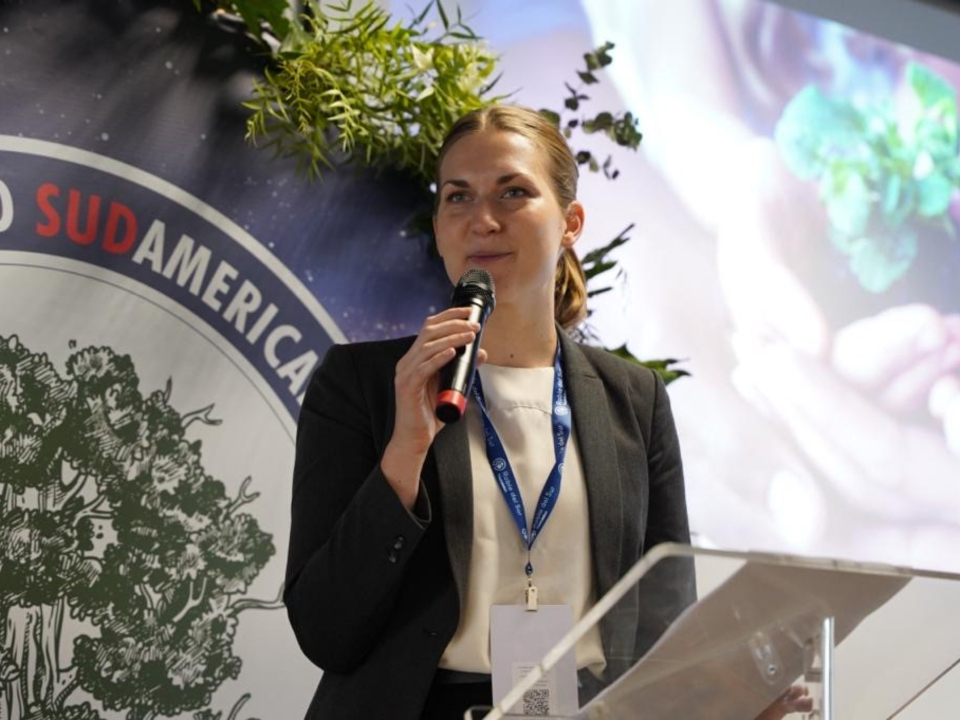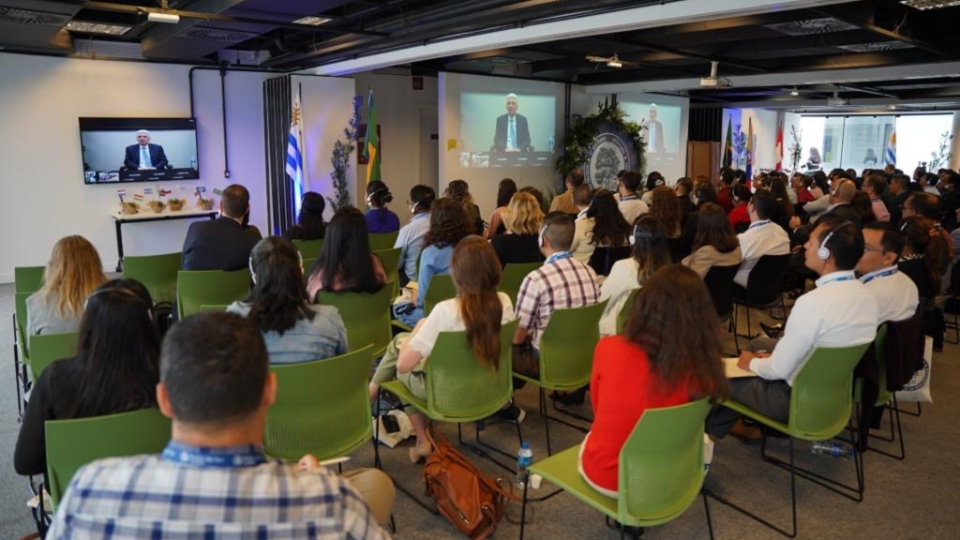At a conference in Brazil on Friday, October 20, 2023, Elder D. Todd Christofferson of the Quorum of the Twelve Apostles said stewardship of God’s creations should be done through the lens of how we can best fulfill God’s purposes.
- Bishop-Causse-Sustainability-10.jpg
- Bishop-Causse-Sustainability-6.jpg
- Bishop-Causse-Sustainability-9.jpg
- Bishop-Causse-Sustainability-5.jpg
- Bishop-Causse-Sustainability-8.jpg
- Bishop-Causse-Sustainability-4.jpg
- Bishop-Causse-Sustainability-7.jpg
- Bishop-Causse-Sustainability-3a.jpg
- Bishop-Causse-Sustainability-1.jpeg
| Temple Square is always beautiful in the springtime. Gardeners work to prepare the ground for General Conference. © 2012 Intellectual Reserve, Inc. All rights reserved. | 1 / 2 |
“In all aspects of our earthly stewardships, our love of God and our discipleship of Jesus Christ will be a sure guide, and surely we will do real good in the world,” the Apostle said at the Seminario SUD Americano 2023 in Florianópolis, Brazil. “May each of you be an instrument in the hand of God, and may your life be a blessing to past, present, and future generations.”
The conference, hosted by Roble del Sur (a group of members and friends of The Church of Jesus Christ of Latter-day Saints), comprised some 100 young professionals from 10 South American countries. The theme was “Our stewardship of God’s creation.” Over the course of four days, participants heard from several Church, civic, academic and business leaders on environmental sustainability, public engagement, caring for human life and other related topics.
“Knowing the ultimate purpose of creation, we measure what we do by that standard, asking ourselves, ‘Would it help, or would it hinder God’s divine plan?’” Elder Christofferson said. “For example, we should use our earthly blessings to minister to the temporal and spiritual needs of others in a way that enables them to come to know and serve God and eventually inherit eternal life.”
Elder Christofferson seconded “something very important about creation” that was said on the conference’s second day by the Church’s Presiding Bishop Gerald Caussé, who spoke virtually.
“The creation of this marvelous world in which we live is not an end in itself; it is the means by which our Heavenly Father’s eternal designs can be accomplished,” Bishop Caussé said. “This earth and everything in it — the towering mountains; the vast oceans; the fertile plains; the green valleys; the meandering rivers; the arid deserts; the innumerable variety of plants, insects, birds and animals — everything, absolutely everything, was created for one purpose: to enable His sons and daughters to inherit exaltation and immortality in eternal family units.”
“The Lord Himself said that without the formation of eternal families through all their generations, the earth’s creation would be ‘utterly wasted,’” Elder Christofferson added.
Read Elder Christofferson’s full address, “Honoring the Creator.”
Bishop Caussé said it is humbling to realize that “each animal, plant and every other temporal thing created by God, was designed and formed as a gift of love for the sole purpose of perfecting, exalting and enabling the eternal happiness of mankind.”
Because the earth is a gift, the Church of Jesus Christ “seeks to be a wise steward of natural resources through responsible management of its global operations,” Bishop Caussé said. This includes six major sustainability priorities outlined by the Presiding Bishopric:
- Increase energy efficiency and use of renewable resources. This includes more than 500 solar energy projects around the world.
- Conserve water through waterwise landscape design, smart technology use and water management plans. A recent example is the landscaping adapted to the desert area around the new Red Cliffs Utah Temple.
- Avoid material waste through reduction, reuse and recycling; packaging solutions; and building methods. The Church recently approved the transition from 40%–70% recycled plastic to 100% recycled plastic in our sacrament cups. Working with third-party consultants to evaluate various sustainable alternatives, the Church discovered that the sacrament cups made from 100% recycled plastic will reduce overall carbon emissions compared to current cups and even paper cups. The Church plans to begin using 100% recycled plastic cups in early 2024.
- Improve air quality and reduce emissions. This includes improving the fuel efficiency of the faith’s global vehicle fleet.
- Practice sustainable design, development and construction. With temples, for example, the Church is mindful of the materials, site selection and methods needed to support their long-term operations and maintenance in an environmentally sound manner.
- Engage in sustainable farming and ranching practices. This includes the use of cover crops, crop rotation, no-till farming, grazing management, greenhouse gas capture and other best practices.
Church Sustainability Manager Jenica Sedgwick told the conference on Wednesday that she has learned how clear vision, continual learning and diverse perspectives can help the Church be a better steward of God’s creations.

Bishop-Causse-Sustainability-8.jpg
Church Sustainability Manager Jenica Sedgwick speaks at the Seminario SUD Americano 2023 conference in Florianópolis, Brazil on Wednesday, October 18, 2023.2023 by Intellectual Reserve, Inc. All rights reserved.For example, at a recent conference in the United Kingdom focusing on women, religion and climate change, Sedgwick heard inspiring stories of women who lead sustainability efforts around the world.
“While each conference participant brought a diverse perspective, our shared beliefs of creation and stewardship, along with our willingness to learn from one another’s varied experiences, created an undeniable sense of respect, unity and productivity,” she said. “I walked away from this conference with new eyes to see how environmental degradation impacts different communities around the world and invigorated creativity regarding potential solutions.”
“As we go forward with faith, courage and persistence, continually learning and seeking diverse perspectives,” Sedgwick said, “we will be led to the success that we seek. No matter the challenge or uncertainty we face, we can be of good cheer, for God is leading us along.”
Bishop Caussé left conference participants with the simple invitation to act.
“Consider ways that you can bless your family, your community, the country in which you live and ultimately the people in need all around the world,” he said. “I hope you will care for your natural environment and adopt personal lifestyles and behaviors that respect, preserve and beautify God’s wonderful creations. I hope you will set an example in reaching out to those affected by natural disasters, the degradation of their natural environment and other hardships. I hope you will prepare yourselves and others for possible emergencies and implement Church principles of provident living and preparedness in your own lives.

Bishop-Causse-Sustainability-9.jpg
Presiding Bishop Gérald Caussé speaks at the Seminario SUD Americano 2023 conference in Florianópolis, Brazil on Wednesday, October 18, 2023.2023 by Intellectual Reserve, Inc. All rights reserved.“Lastly,” he concluded, “one of the most important things you may ever do is to pray and ask God to bless and protect you and the community in which you live. The scriptures are replete with examples that demonstrate the importance of accompanying our personal and collective efforts with diligent prayer.”
Read Bishop Caussé’s remarks, “Caring for God’s Creations: A Duty of Love.”